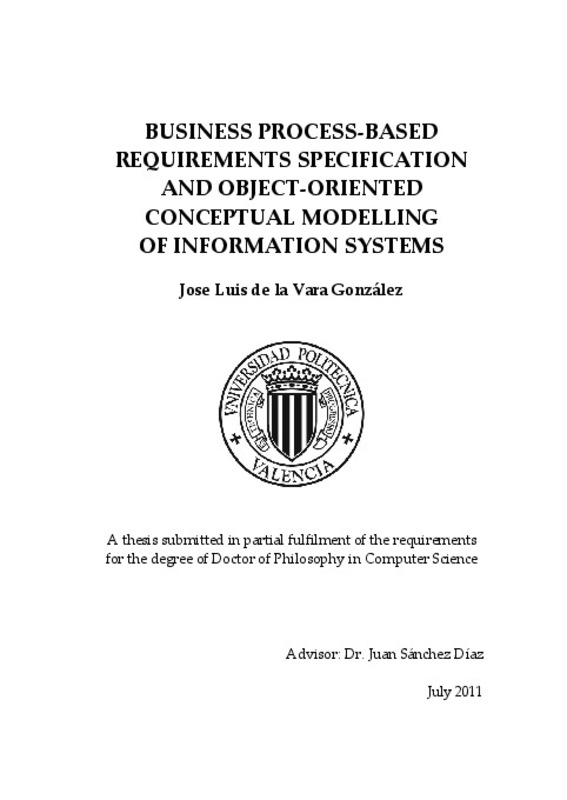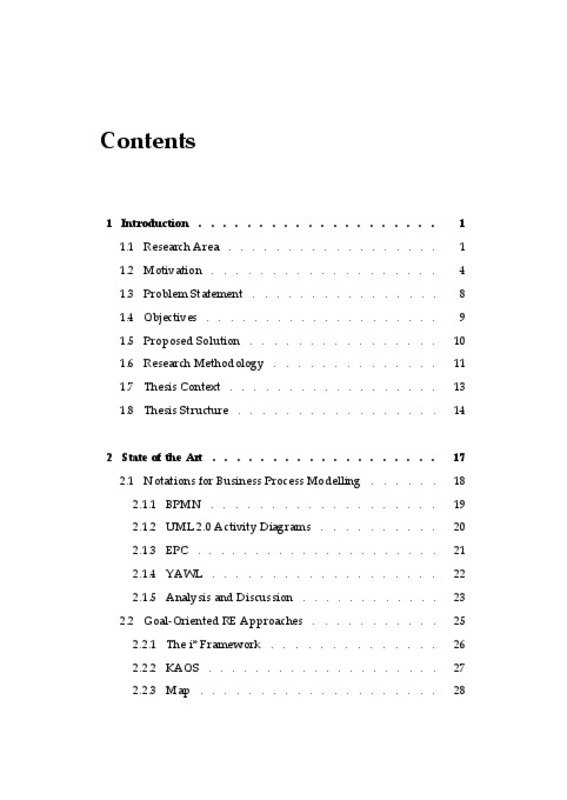- RiuNet repositorio UPV
- :
- Investigación
- :
- Tesis doctorales
- :
- Ver ítem
JavaScript is disabled for your browser. Some features of this site may not work without it.
Buscar en RiuNet
Listar
Mi cuenta
Estadísticas
Ayuda RiuNet
Admin. UPV
Business process-based requirements specification and object-oriented conceptual modelling of information systems
Mostrar el registro sencillo del ítem
Ficheros en el ítem
| dc.contributor.advisor | Sánchez Díaz, Juan
|
es_ES |
| dc.contributor.author | de la Vara González, José Luis
|
es_ES |
| dc.date.accessioned | 2011-09-05T09:11:02Z | |
| dc.date.available | 2011-09-05T09:11:02Z | |
| dc.date.created | 2011-07-21T08:00:00Z | es_ES |
| dc.date.issued | 2011-09-05T09:10:51Z | es_ES |
| dc.identifier.uri | http://hdl.handle.net/10251/11445 | |
| dc.description.abstract | Two of the main needs when developing an information system for an organization are that system analysts know and understand the application domain and that the system properly supports the business processes of the organization. Consequently, elicitation of system requirements from business process models has been acknowledged as a suitable activity to deal with that needs. In addition, system requirements must be linked to subsequent development stages. However, system analysts can face many challenges when performing these activities. They may have problems communicating with customer stakeholders and may need to analyse and operationalize the purpose of the information system. Furthermore, system analysts must bridge the gap between business and system domains for specification of system requirements, specify different types of system requirements and guarantee that their specification is precise, consistent and homogeneous. In relation to object-oriented conceptual modelling-based information system development, system analysts must also avoid potential problems that may arise when a conceptual schema is created from system requirements as part of their link with subsequent development stages. For example, a conceptual schema can be incomplete and/or inconsistent if it is not properly managed. As a solution, this thesis presents a methodological approach for business process-based requirements specification and object-oriented conceptual modelling of information systems. The approach consists of four stages: organizational modelling, purpose analysis, specification of system requirements and derivation of object-oriented diagrams. By following the design research methodology for performing research in information systems, the methodological approach has been designed on the basis of many existing ideas and principles in academia and industry and provides new principles, mechanisms and guidance to address the challenges presented above. | es_ES |
| dc.language | Inglés | es_ES |
| dc.publisher | Universitat Politècnica de València | es_ES |
| dc.rights | Reserva de todos los derechos | es_ES |
| dc.source | Riunet | es_ES |
| dc.subject | Requirements engineering | es_ES |
| dc.subject | Business process modelling | es_ES |
| dc.subject | Conceptual modelling | es_ES |
| dc.subject | Information system | es_ES |
| dc.subject | Requirements specification | es_ES |
| dc.subject | Bpmn | es_ES |
| dc.subject | Extended task description | es_ES |
| dc.subject.classification | LENGUAJES Y SISTEMAS INFORMATICOS | es_ES |
| dc.title | Business process-based requirements specification and object-oriented conceptual modelling of information systems | |
| dc.type | Tesis doctoral | es_ES |
| dc.identifier.doi | 10.4995/Thesis/10251/11445 | es_ES |
| dc.rights.accessRights | Abierto | es_ES |
| dc.contributor.affiliation | Universitat Politècnica de València. Departamento de Sistemas Informáticos y Computación - Departament de Sistemes Informàtics i Computació | es_ES |
| dc.description.bibliographicCitation | De La Vara González, JL. (2011). Business process-based requirements specification and object-oriented conceptual modelling of information systems [Tesis doctoral]. Universitat Politècnica de València. https://doi.org/10.4995/Thesis/10251/11445 | es_ES |
| dc.description.accrualMethod | Palancia | es_ES |
| dc.type.version | info:eu-repo/semantics/publishedVersion | es_ES |
| dc.relation.tesis | 3622 | es_ES |
Este ítem aparece en la(s) siguiente(s) colección(ones)
-
Tesis doctorales [5389]







![Text file [Text]](/themes/UPV/images/text.png)


